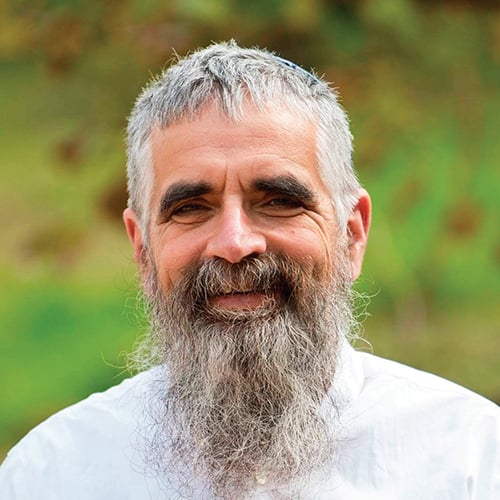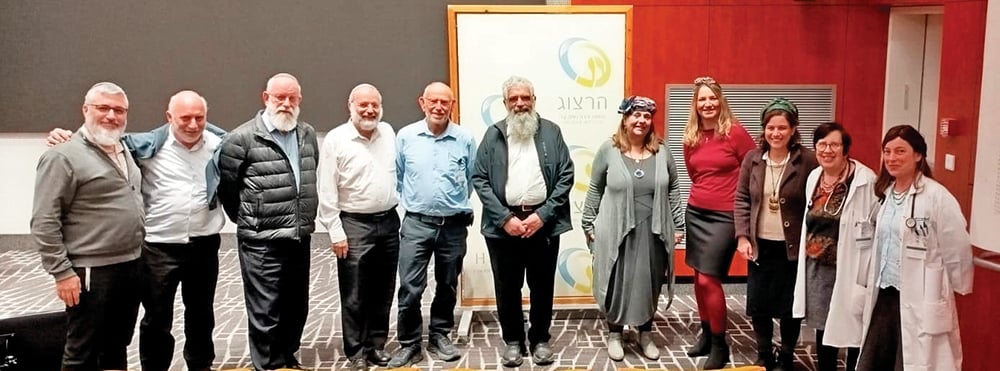
For families coping with the challenges of a loved one with serious illness, the process can be both frightening and confusing, presenting a myriad of questions regarding medical care as well as ethical and halachic decisions. Providing families with support in navigating those dilemmas is the inspiration for the Tzohar Ad 120 service, developed by the Israel-based Tzohar Rabbinical Organization.
Taking its name from the traditional understanding that a long Jewish life extends to 120 years, the service uniquely brings together rabbis and social workers to provide compassionate and informed responses to varying questions.
The rabbinical director of the service, Rabbi Yuval Cherlow, who also directs the Tzohar Center for Jewish Ethics, is highly respected as one of the Jewish world’s most experienced medical ethicists, regularly advising the Israeli government and many other international entities on a wide variety of ethical issues.
“In recent years, medical technology and care has been enhanced significantly in ways that directly enables life to be extended in ways that weren’t possible in the past,” explained Cherlow. “But this situation also introduces many new ethical questions and dilemmas about how we ensure people are being cared for with both dignity and in accordance with halachic and ethical practice as they reach the end of life.”

To address these types of issues, Tzohar Ad 120 operates a telephone hotline in Israel that is available free of charge and for people all over the world, 24 hours a day, six days a week. A staff member will review the case and then coordinate follow-up meetings with a rabbi and social worker who are specially trained and equipped to assist families dealing with very specific, and often extremely complex, ethical, halachic and practical dilemmas.
In addition, the program has presented several online webinars addressing issues ranging from preparing advanced directives for end of life, managing the challenges of helping loved ones with dementia, and the halachic and ethical implications of palliative medicine. The organization is available to develop custom programs (either online or in person) for the interests of specific communities.
“Our goal is to act as an accessible and relatable resource for people to gain information before they might need it, but to also know that when questions present themselves in times of crisis, we are available,” explained Rabbi Yaron Moshkowits, director of Tzohar’s Center for Jewish Ethics, who is also responsible for overseeing the Tzohar Ad 120 service. “But where we believe we really have a service that isn’t available anywhere else is bringing together rabbis and social workers who are intimately experienced and informed to provide compassionate solutions without requiring families to go elsewhere in their times of need.”
Since its launch amidst the COVID pandemic, the program has been working to create an online database in both Hebrew and English of case studies and questions pertaining to a wide range of issues. A comprehensive guide available for download on the website was released in 2022 as an in-depth halachic analysis of issues surrounding terminally ill patients and dementia. Alongside a summary of several medical interventions, the authors of the guide, led by Cherlow, address different issues that relate to fulfilling religious obligations when a patient is in a compromised state and praying for a patient at the end of his life, among other issues.
“As this program developed, we quickly came to the understanding that our role was far more than just providing yes or no answers to some of the most complex ethical dilemmas people are likely to confront at some point in their lives,” Cherlow said. “Rather, it became clear that our responsibility would be to actually accompany these people in having both the practical and emotional tools to address these times of challenge and to know that they are not alone. For a family in crisis, uncertainty, fear or confusion, this is a service that can be truly transformative and something that will be instantly appreciated even when they didn’t realize how much it would be needed before they reach out to us.”
Since its launch, the program has assisted dozens of families in times of need. While naturally the majority of those assisted are dealing with elderly loved ones, in some instances the Tzohar Ad 120 team has been called on to assist in medical cases involving children and even infants. Moshkowits said that the program has developed close working relationships with hospital staff. “They recognize the value of our service because we serve as a professional conduit to communicate between families and the medical teams.”
In addition to its core team of rabbis and social workers, Tzohar Ad 120 relies on an advisory council of some of Israel’s top physicians and academic experts in areas of geriatrics, palliative medicine and patient care.
Shirly Saaroni, who serves as senior social worker for the program said, “We meet with people of all backgrounds and levels of observance. But the common denominator is the sincere desire to respect their loved ones and ensure that they are being treated with dignity. Our goal is to ensure you are receiving a comprehensive response that relates both to the needs of the patient and the family. We take great pride in serving as a compassionate and informed voice at times when it is needed most. We encourage individuals and families to reach out because there is no reason to have to go through these moments alone, and we are here and equipped to assist.”









